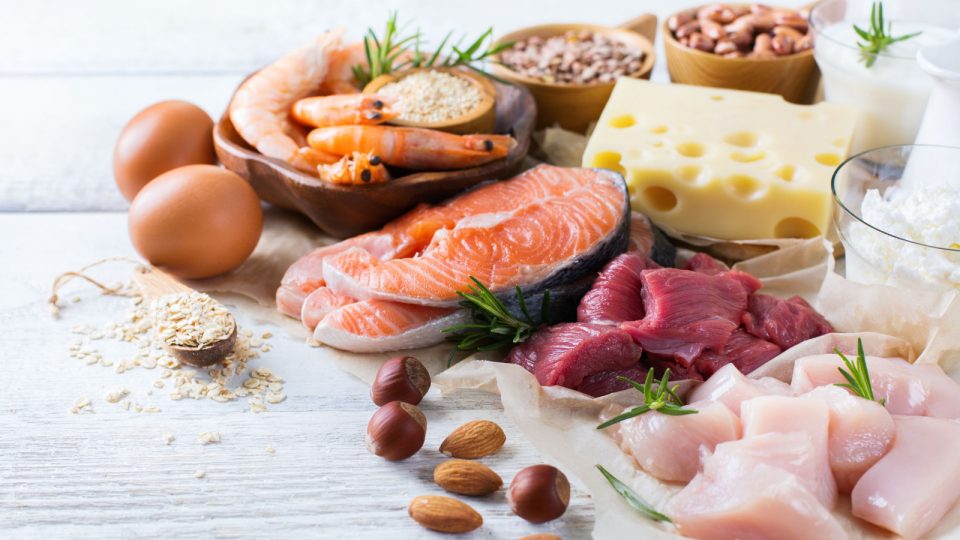Packed with health benefits, protein plays a pivotal role in fueling an active lifestyle, offering significant protein benefits that can’t be ignored. This powerhouse nutrient doesn’t just elevate endurance; it’s crucial for muscle repair, growth, and recovery, especially after a spirited run or rigorous exercise. Consequently, it’s no surprise that runners and fitness aficionados closely monitor their protein consumption.
But the benefits of protein extend beyond muscle support. It’s a cornerstone for metabolic health and effective weight management. Intrigued by how the benefits of protein can boost your fitness regimen?
Here are six persuasive reasons why embracing a protein-rich diet could be your hidden advantage for achieving a healthier, more fit self.
Table of Contents
1. Protein is crucial for building muscles and increasing strength

Whether your goal is muscle gain or strength enhancement, adequate protein intake is non-negotiable. Consuming sufficient protein helps guard against muscle loss while fostering muscle growth, especially crucial if your fitness regimen includes strength training activities like weight lifting.
2. Protein consumption helps to reduce hunger levels
The three macronutrients – fats, carbs, and protein – interact with your body distinctively. Research underscores protein’s remarkable ability to induce satiety, keeping you full for extended periods. By boosting the peptide YY levels, protein curbs hunger pangs, playing a pivotal role in weight management.
3. Increasing protein intake can help regulate food cravings and late-night snacking

Food cravings are less about energy need and more about your brain seeking a ‘reward.’ Taming these can be challenging, but here’s a simple trick – up your protein intake. Doing so can effectively keep those late-night snack urges at bay.
4. Consuming protein boosts metabolism and enhances fat burning
Did you know that eating sparks a short-term increase in your metabolism due to the Thermic Effect of Food (TEF)? Among the macronutrients, protein boasts the highest TEF, translating to more calories burnt and a metabolism boost when you consume a protein-rich diet.
5. Protein aids in repairing your body after an injury

Just as you heard, protein can expedite the repair of muscle tissues post a rigorous workout or injury. Being the building blocks of your muscles, consuming an appropriate amount of protein ensures faster recovery.
6. Protein intake does not harm healthy kidneys
One common concern that many have is the potential harm high protein consumption might inflict on the kidneys. This concern stems from the fact that for individuals with existing kidney diseases, a higher protein intake can indeed exacerbate their condition. Consequently, they are often advised to restrict protein consumption and take other precautionary measures to avert further kidney damage.
Nonetheless, it’s crucial to differentiate between individuals with kidney ailments and those with healthy kidneys. A diet high in protein may pose challenges to people with kidney disorders, but this does not imply that the same holds true for individuals whose kidneys are functioning well.
Recent scientific studies shed light on this concern, indicating that a high-protein diet poses no harm to those with healthy kidneys. This robust body of research reiterates that individuals with well-functioning kidneys can confidently consume protein-rich foods without the fear of kidney damage.
Hence, let’s dispel the myth and understand that for those with healthy kidneys, protein is a friend, not a foe. By focusing on a balanced diet that includes appropriate portions of protein, we can take full advantage of its myriad health and fitness benefits.
A Comprehensive Protein List of Foods
Let’s make your protein intake simpler with a handy list of common protein-rich foods along with their protein values:
| Food | Protein Content |
|---|---|
| 1 Large Egg | 6g |
| Ground Beef (85% lean, 3 oz) | 22g |
| Skinless Chicken Breast (3 oz) | 26g |
| Lentils (1 cup, cooked) | 18g |
| Greek Yogurt (1 cup) | 20g |
| Quinoa (1 cup, cooked) | 8g |
| Tofu (3 oz) | 9g |
| Almonds (1 oz) | 6g |
| Salmon (3 oz) | 19g |
| Cottage Cheese (1 cup) | 28g |
| Tuna (3 oz, canned) | 20g |
| Peanut Butter (2 tbsp) | 8g |
| Tempeh (1 cup) | 31g |
| Black Beans (1 cup, cooked) | 15g |
| Pumpkin Seeds (1 oz) | 9g |
| Oats (1 cup, cooked) | 6g |
| Turkey Breast (3 oz) | 24g |
| Shrimp (3 oz) | 18g |
| Soy Milk (1 cup) | 8g |
| Chia Seeds (2 tbsp) | 5g |
Embracing the Protein Benefits
Unlock the vast array of protein benefits for your health and fitness by making protein-rich foods a staple in your diet. Incorporate essentials like eggs, ground beef, and other powerhouses from our ‘protein foods list’ into your daily regimen.
We’re excited to follow your journey as you harness the benefits of protein. Share with us your go-to protein-rich foods and how they’ve elevated your fitness and health.
Don’t delay; tap into the power of protein today and witness the transformative effects on your health and fitness firsthand.
What are the top sources of protein for vegetarians?
For vegetarians, lentils, quinoa, tofu, Greek yogurt, and almonds are some of the best sources of protein.
How much protein should I consume daily to maintain a healthy fitness level?
The recommended daily protein intake varies based on age, sex, and activity level. On average, adult women require about 46 grams, and adult men need around 56 grams. However, these requirements may increase if you lead an active lifestyle or engage in regular strength training.
Is consuming protein immediately after a workout beneficial?
Yes, consuming protein within the 30-minute window after a workout can aid in muscle recovery and growth.
Can high protein diets lead to weight loss?
A high protein diet can support weight loss as it promotes feelings of satiety, reduces overall calorie intake, and increases metabolic rates.
Can high protein diets lead to weight loss?
A high protein diet can support weight loss as it promotes feelings of satiety, reduces overall calorie intake, and increases metabolic rates.
Can I consume too much protein?
While it’s challenging to consume too much protein through diet alone, excessive protein supplementation can potentially lead to digestive issues, kidney damage (in people with pre-existing kidney disease), and nutrient deficiencies.
Are protein supplements as effective as protein from food sources?
While protein supplements can be a convenient way to meet your protein needs, whole foods offer additional nutrients like fiber, vitamins, and minerals that are not typically found in supplements. Hence, a diet rich in protein from diverse food sources is generally recommended.
Is it possible to build muscle without consuming high amounts of protein?
While protein is essential for muscle growth, balance is key. A well-rounded diet that includes a mix of protein, carbohydrates, and fats, paired with regular strength training, is crucial for muscle development.





